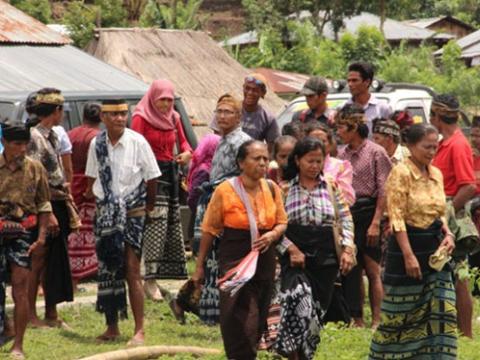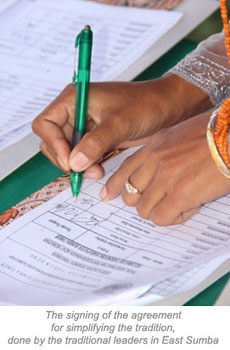Simplify the Tradition for the Children

It was so hot that day. The scorching sun shone brightly and greeted every creature with its unbearable heat. This atmosphere did not deter the fanfare that’s happening in the village of Billa, in Tabundung, in southern-part of Sumba Island in East Nusa Tenggara province on Friday, 22 November 2013. Hundreds of people gathered to the sub-district office wearing their best traditional costumes. The dynamic sound of gongs and drums greet all the enthusiastic guests.
The people of East Sumba are known for their lavish and expensive traditions, both during wedding and funeral ceremonies. The practices are widely conducted despite the financial troubles they bring. The families have to slaughter tens of cows, horses and pigs during such funeral ceremonies, animals "given" to them by their neighbors and families. The elaborate ceremonies secure high status recognition from the neighbors and families.
However after the ceremonies are over, the families often face a mountain of debt. The practice to repay what all the guests have given during the wedding and funeral ceremonies leave many families mired in debt throughout their lives.
Many East Sumba residents, such as those in Tabundung, are still living below the poverty line. They cannot even afford the basic needs for their family members, including the health and education of the children.
“It is time for us to reform the tradition to their very essential function. The current tradition has been too wasteful.” uttered dr. Lapoe Moekoe
“It is time for us to reform the tradition to their very essential function. The current tradition has been too wasteful. A lot of Sumba children actually have potential, but, due to the lack of funds due to the wasteful traditions, they fail to realize their dreams,” uttered dr. Lapoe Moekoe, head of the East Sumba Tradition Forum as the meeting commenced that noon-time.
Umbu Nai Pajaru is a real example of this too-lavish and burdensome tradition. His family was once the richest family in the sub-district. However after his father passed away, his wealth was spent entirely on financing the funeral ceremony. Due to this, he could not afford to continue his education to higher level.
“My father’s wealth was completely used up for his funeral ceremony. And when I was in the 8th grade I was kicked out of school for not being able to pay the Rp 700 school fee. Other people have been able to secure university degrees, but I don’t have such an opportunity. I am the victim of the tradition,” he said.
Learning from his gloomy experience has motivated him to take action. He has a vision that the younger generation -- the children of East Sumba -- would not fall into the same hole. Therefore, he has joined and fully supports the efforts of the Forum for Tradition Reformation in East Sumba. The Forum has been advocating that the local people substantially simplify the ceremonial traditions in the 10 villages in Tabundung.
The year-long work of advocacy in the villages has started paying off. The community of nine villages in Tabundung agreed to simplify the ceremonies. The funeral ceremony must be completed within eight days, not for several weeks as in the past. And the family only has an obligation to slaughter a maximum of five pigs during the funeral ceremony.
On that day, 434 people from the nine villages in Tabundung gathered to witness the declaration of the simplification of the funeral ceremony. The documents of the agreement were signed by all relevant parties. Everyone, old and young, government officials from the tourism ministry, sub-district head and head of the village did not want to miss this historical moment.
A participant from Wudipandak Village who welcomed the agreement said, “This declaration is very significant. So far, the funeral tradition is one of the main contributors of our poverty.”
He agreed that without being realized, the funds they used for the lavish tradition was too much and it is indeed high time for this nightmare to be ended.
This declaration is the foundation for the people in Tabundung to be able to better develop their future. So far, the socialization on traditions improvement and simplification has been done in 41 villages in East Sumba and 13 villages have agreed to formally declare the simplfied tradition practices.
*Written by Beatrix Mbete, staf of Wahana Visi Indonesia East Sumba office | Edited by Hendro Suwito,
